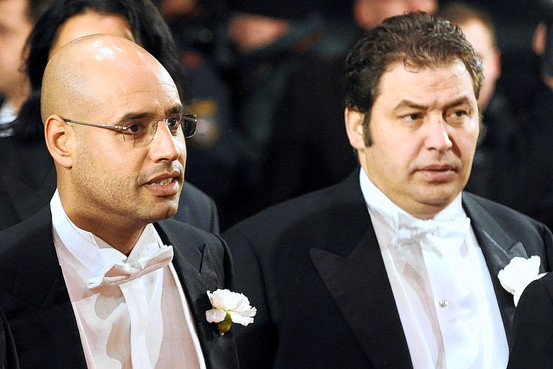
Col. Gadhafi's son, Saif al-Islam Gadhafi, on left, with Mustafa Zarti, a former executive at Libya's sovereign-wealth fund.
--
In early 2008, Libya's sovereign-wealth fund controlled by Col. Moammar Gadhafi gave $1.3 billion to Goldman Sachs Group to sink into a currency bet and other complicated trades. The investments lost 98% of their value, internal Goldman documents show.
What happened next may be one of the most peculiar footnotes to the global financial crisis. In an effort to make up for the losses, Goldman offered Libya the chance to become one of its biggest shareholders, according to documents and people familiar with the matter.
Libya was furious at Goldman over the nearly total loss of the $1.3 billion it invested in nine equity trades and one currency transaction, people involved in the matter say. A confrontation in Tripoli between a top fund executive and two Goldman officials left the bankers so rattled that they made a panicked phone call to their bosses, these people say. Goldman arranged for a security guard to protect them before they left Libya the next day, they say.
Discussions inside Goldman about how to salvage the fractured relationship included Lloyd C. Blankfein, the company's chairman and chief executive, David A. Viniar, its finance chief, and Michael Sherwood, Goldman's top executive in Europe, according to documents reviewed by The Wall Street Journal and people involved in the negotiations. All three executives declined to comment.
Youssef Kabbaj, the Goldman executive in charge of North Africa, became a frequent presence at the Libyan Investment Authority as the investment bank worked to expand the relationship. He worked with the fund's management on investment ideas and encouraged younger employees to deepen their financial knowledge by attending Goldman training sessions, these people said.
Goldman soon carved out a new business with the Libyans, in options—investments that give buyers the right to purchase stocks, currencies or other assets on a future date at stipulated prices. Between January and June 2008, the Libyan fund paid $1.3 billion for options on a basket of currencies and on six stocks: Citigroup Inc., Italian bank UniCredit SpA, Spanish bank Banco Santander, German insurance giant Allianz, French energy company Électricité de France and Italian energy company Eni SpA. The fund stood to reap gains if prices of the underlying stocks or currencies rose above the stipulated levels.
But that fall, the credit crisis hit with a vengeance as Lehman Brothers failed and banks all over the world faced financial crises. The $1.3 billion of option investments were hit especially hard. The underlying securities plunged in value and all of the trades lost money, according to an internal Goldman memo reviewed by the Journal. The memo said the investments were worth just $25.1 million as of February 2010—a decline of 98%.
No comments:
Post a Comment